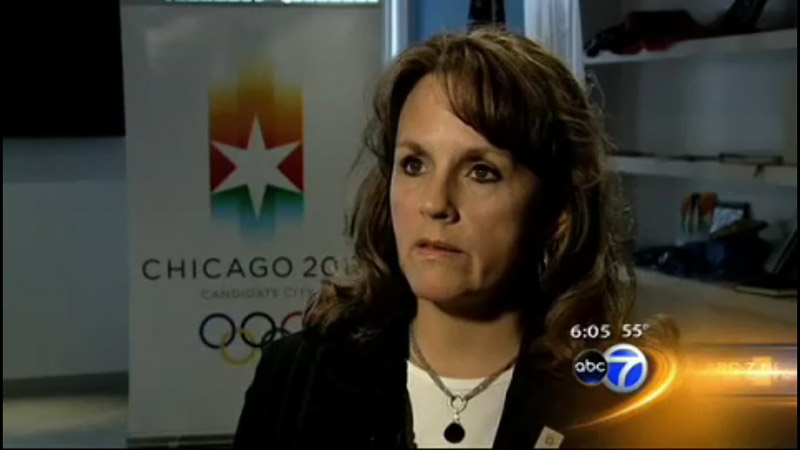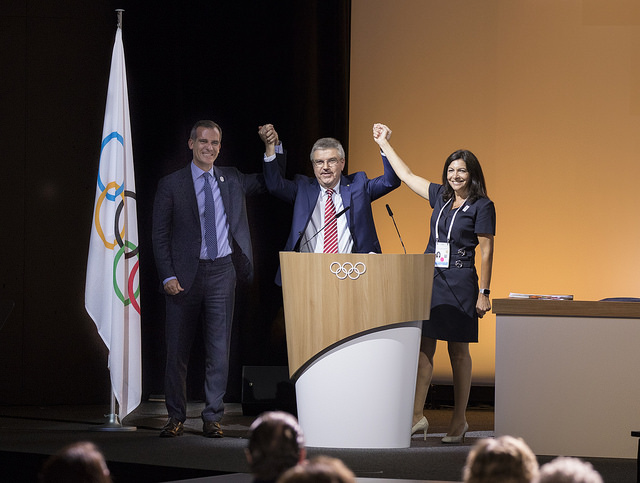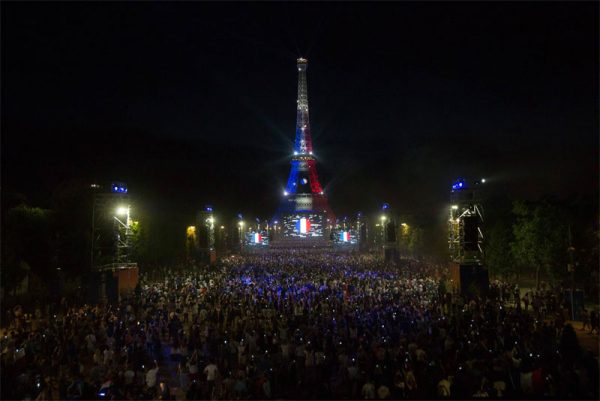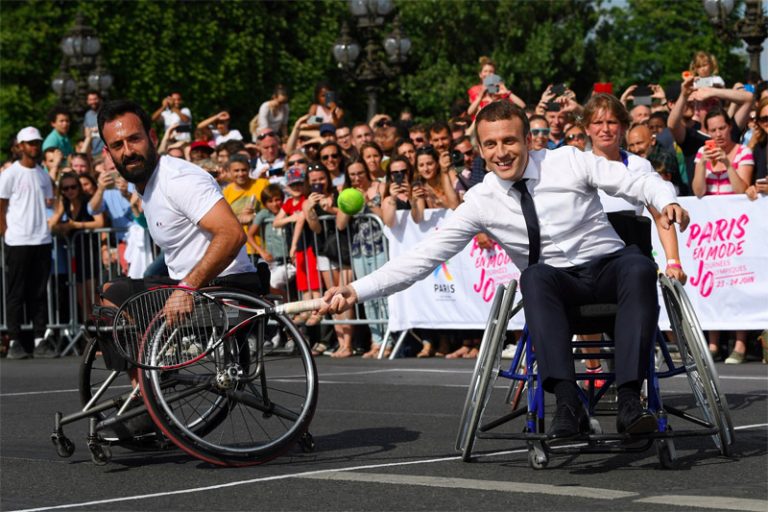 You may be be wondering where BidIndex for the 2024 Olympic and Paralympic Games bid is.
You may be be wondering where BidIndex for the 2024 Olympic and Paralympic Games bid is.
The familiar list of bid cities that for almost 20 years has adorned the top-right panel of the GamesBids.com Website, complete with numeric indicators giving the sense of where the race is at – disappeared last week.
But then again, for all practical purposes – so did the 2024 Olympic bid race.
Los Angeles Mayor Eric Garcetti hammered the final nail in the coffin of the Olympic bid race that never was when Thursday he uttered “we’d be stupid not to take ’28,” referring to financial incentives the International Olympic Committee (IOC) is offering for LA to step back from the 2024 bid, allow rival Paris to host then instead, and return to stage the Games in 2028.
The Mayor promised more news this week, probably coinciding with a trip by officials to Lausanne, or some other place, to sign a tripartite agreement that would turn the IOC Session’s 2024 bid election vote into a simple ratification vote approving Paris for 2024 and LA for 2028.
But without a vote, and without a race – there can be no BidIndex. We had been ready to release our analysis on a couple of occasions, but then Hamburg lost a referendum. Following that, Rome elected a Mayor that campaigned against the Olympics and who later scrubbed the plans. Budapest citizens were rallied to oppose their bid causing Hungary’s President to rethink his political strategy and remove his support from the project. Then, there was talk of a double-allocation.
The 2024 ‘race’ became instead a game of survival in what seemed to be an elaborate lab experiment to determine the relevancy of the International Olympic Committee’s (IOC) Agenda 2020 reforms on the Games sustainability and ‘hostability’. BidIndex was never designed for that.
BidIndex was designed to use past Olympic bid voting patterns by International Olympic Committee (IOC) members, and compare them with current bid city projects to determine how closely they correlate – and which city is is the closest match. The theory has been, the closer the match the more likely the city is to be elected.
We’ve used many fundamental data points – as many as 100 – to measure the bids. Each factor is weighted differently, depending on how much they seem to impact the members’ decision making processes. In the past IOC members have liked large construction projects, grandiose physical legacies, places that are familiar – or have bid multiple times, and often cities that are supported by the IOC President. These are but a few examples.
While GamesBids.com has taken much criticism over the years for this statistical analysis of what most believe to be a highly subjective and politically charged bid election process, all we can do is stand behind the results.
In 2009, Chicago 2016 Olympic bid President Lori Healey told Chicago’s ABC 7 news that her bid didn’t care about BidIndex. Fair enough – it’s a measurement, not a determining factor for a bid.
She went on to incorrectly say, referring to the GamesBids.com team “this is a single individual, a single entity that spends a lot of time crunching numbers on a computer.”

“One analyst based in Canada,” the ABC reporter said with emphasis on Canada, was behind this perceived dissing of Chicago’s Olympic dreams.
Healey added “what it doesn’t include is the subjective things that are very good about our bid.”
It hurt, a bit, to hear the President of a bid summarily dismiss myself – the key contributor behind BidIndex – as someone who simply crunches numbers on a computer. She omitted the fact that I’ve also spent a lot of time (more than most, and certainly more in the past than Ms. Healey) attending IOC Sessions and meetings, bid Evaluation visits and closely following the process beat-by-beat.
But her thoughts reveal exactly what has been wrong with previous bid races, why past Games have run into trouble and why IOC President Thomas Bach has found it necessary to take control of the 2024 bid race and change everything for the future.
Bids have not been elected based on measurable quality and other underlying elements that would lead to their success. Winning cities have instead been chosen based on a plethora of other factors that are generally not in the best interests of the Olympic Movement.
That’s why BidIndex was developed, to measure the way IOC Members are likely to vote – NOT to determine the best bid. Otherwise, the summary provided by in the IOC Evaluation report for each bid city should suffice in pointing to the winner. In reality, the best scoring city in the IOC’s report and elected host city rarely correlate.
No matter, gamblers made Chicago 2016 the odds-on favourite to host the Games – they know what they’re doing, right? Don’t bet on it. At the time of Healey’s comments, BidIndex put Chicago fourth with Rio in the top spot. The final election results? Rio first, Chicago fourth.
Since Rio’s upset over Chicago, BidIndex has always given top score to the eventual winner. Four in a row.
Winner PyeongChang was highest ranked for 2018 – not a big surprise – but elected 2020 host city Tokyo received the highest score even as many had pointed to either Madrid or Istanbul to win the Games. BidIndex also chose winner Beijing over Almaty for the close vote to host the 2022 Games.
It doesn’t matter how it turned out in 2016, with many considering the Rio 2016 Games a marked disaster. The IOC’s election approach, the one BidIndex is designed to measure, has led to bad decisions leaving the IOC with the bid and host city issues it has today.
Moving forward the IOC has committed to changing the process. At the last IOC Session in Lausanne a panel of four Vice Presidents announced changes to the 2026 Olympic Winter Games bid process – but a vote by the IOC membership is still planned. The next Summer Games bid vote will be for 2032, likely in 2025.

The IOC President and his Executive Board took control, and took the vote out of the hands of the IOC members for both 2024 and 2028. But with future host cities still facing full membership elections, will old habits remain? Will bad choices continue?
BidIndex will return for 2026 if there is indeed a race. There’s still no guarantee of that though with the only two serious European bidders – Sion and Innsbruck – set to face difficult referendums, and the only other developed bid so far from Calgary facing skepticism from City Council over questionable costs.
As much as we love to calculate and publish BidIndex, the first and de facto leader in bid scoring – if the IOC instead charged its Executive Board, and not the general membership to elect host cities, BidIndex would become obsolete.
But that won’t happen so fast.
BidIndex will be back.


